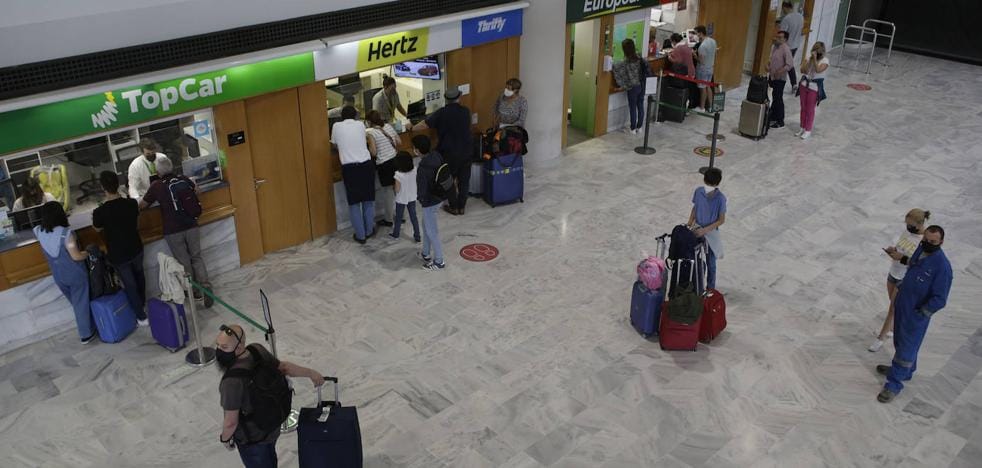Easter occupies all rental cars in the Canary Islands despite growing the fleet by 127% from minimum

Tourists at Arrecife airport in Lanzarote wait to collect a rental car. /
The sector warns that tourists who arrive from tomorrow will have problems finding a vehicle. The companies have managed to increase their fleet and the archipelago already has 50,000 units compared to the 22,000 that existed when the covid broke out
The good progress of the tourism sector this Easterwith occupancies close to 90% and even higher depending on the area,
has led the 'rent a car' sector in the Canary Islands to put up the sign 'there are no cars available' during almost the entire holiday period. Until yesterday there was still some availability, but as of tomorrow those tourists who arrive on the islands without a reservation are going to find "problems" in finding a rental car, according to Roberto Dávila, general secretary of the Association of Canary Car Rental Companies. Vehicles (Aecav, which integrates large companies) and also CEO of the Avis company.
The islands of Lanzarote and Fuerteventura were the first to hang the "full" sign but the 'rent a car' have barely moved vehicles between islands this year due to the high cost of maritime transport. As Dávila indicates, taking a car from one island to another to cover a peak in demand can cost 300 euros, twice as much as a year ago. “A greater increase in the price of tickets is also expected due to the rise in oil,” he points out.
The vehicle availability problems occur despite the fact that the nearly 300 companies that operate on the islands have made a great effort in recent months to increase their fleet to meet the growing demand for tourism after the sixth wave of the pandemic. The 'rent a car' have increased the supply of available vehicles by 40% in recent months, which today amounts to 50,000 units compared to 35,000 at the end of last year.
Compared to the 22,000 units that remained after the thinning to which the sector was forced after the covid broke out, the increase is 127%. «Holy Week has been the awakening of the tourism sector in the Canary Islands. We expected good figures, although not such good growth," says Dávila, who assures that rental companies have done everything possible to increase their fleets, but the situation remains difficult.
"Before the war the situation was already complicated by the lack of components that was delaying the manufacture of vehicles, with the war everything has intensified," warns Dávila. As he points out, companies "are buying what they can and what is out there." "It's like candy at the door of a school, we all want it and we fight for it," says the general secretary of Aecav to graphically point out how the situation is.
Despite the increase of 127% of the available fleet, there is still a long way to go to reach the optimum levels in the islands to meet all the demand. According to Dávil, it would be necessary for the 'rent a car' vehicles to increase from the current 50,000 to 65,000. Meanwhile, the 'gap' between supply and demand will be 30% in the peak periods.
In this situation, for the summer if the current tourist forecasts are met, a "real problem" is expected with rental cars. In fact, 'rent a car' companies are advising tour operators that their clients come with car reservations made in advance. "If they don't, they will find themselves with the problem that they won't have a car," says Dávila.
Prices rise in the Canary Islands and will no longer fall
The 'gap' or mismatch between supply and demand causes prices to rise. This Easter, car rental prices are 20% above the same period in 2019 although they are below last Christmas. According to Dávila, the increase that has occurred in the 'rent a car' in the Canary Islands has come to stay due to the general increase in costs and which means that today the purchase of a vehicle is 13% higher than a year ago. «
Renting a car in the Canary Islands for a week at 200-220 euros is a reasonable price and here it will stay on average even though it can go up at specific times, ”indicates Dávila, who assures that the price of 125-135 euros a week before covid is left behind.











